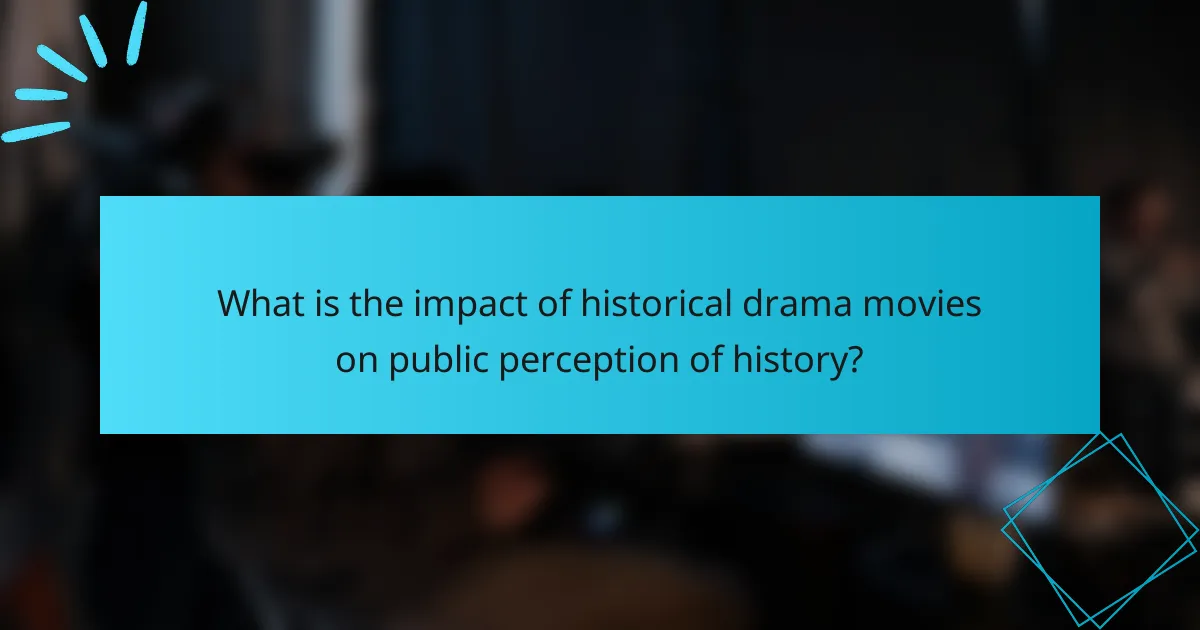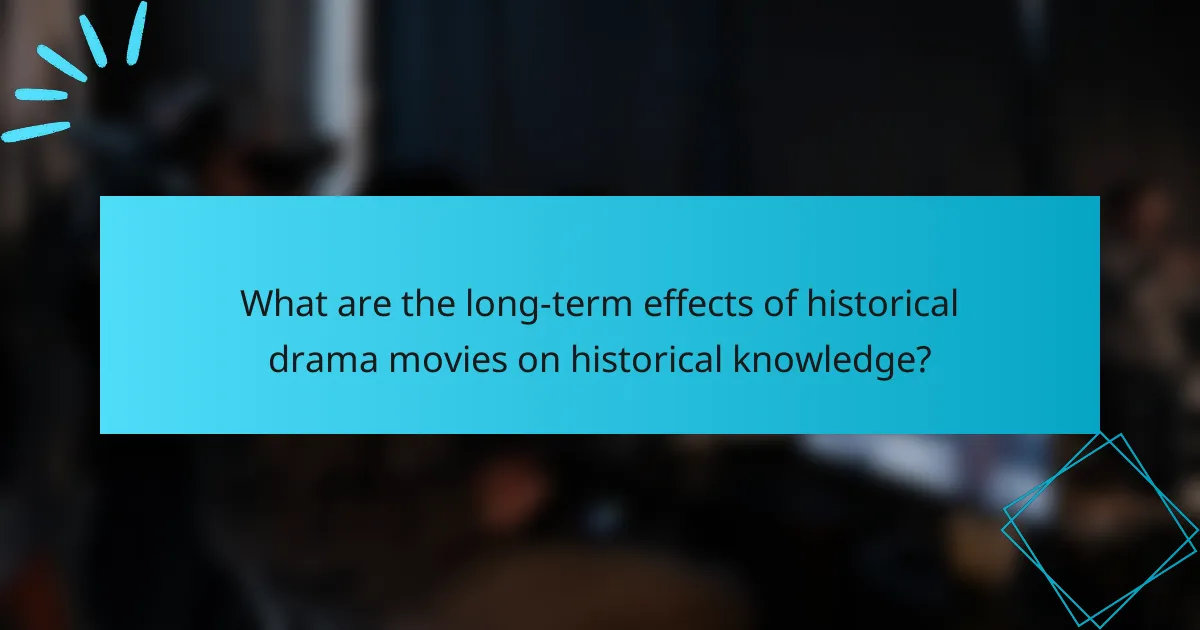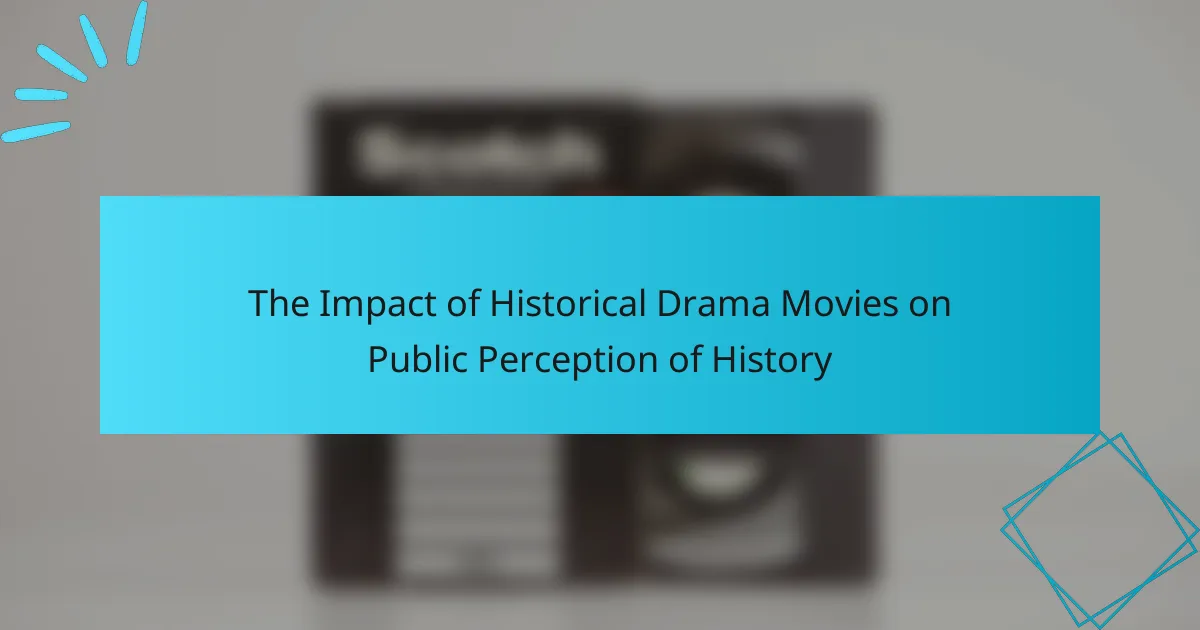
What is the impact of historical drama movies on public perception of history?
Historical drama movies significantly influence public perception of history. They often dramatize real events, making them more engaging and memorable. This can lead to a skewed understanding of historical facts. For example, films like “Braveheart” and “The Patriot” emphasize certain narratives while omitting others. Studies show audiences may accept these portrayals as accurate representations. Research by the American Historical Association indicates that many viewers struggle to differentiate between fact and fiction in these films. This impact can shape cultural memory and historical discourse. Consequently, historical dramas can both educate and misinform the public about past events.
How do historical drama movies shape our understanding of past events?
Historical drama movies shape our understanding of past events by dramatizing historical narratives for audiences. They present a stylized interpretation of history, often blending fact with fiction. This combination can make historical events more relatable and engaging. For example, films like “Schindler’s List” and “12 Years a Slave” highlight significant social issues and human experiences. They can evoke emotional responses that foster empathy and awareness. Historical dramas also influence public discourse by popularizing certain interpretations of events. This can lead to a skewed perception of history if viewers accept these portrayals as entirely factual. Ultimately, these films serve as both educational tools and cultural artifacts that reflect contemporary values and beliefs about the past.
What narrative techniques do these films employ to influence viewers?
Historical drama films employ various narrative techniques to influence viewers. These techniques include character development, emotional appeal, and non-linear storytelling. Character development helps viewers connect with historical figures, making their experiences relatable. Emotional appeal evokes feelings that enhance audience engagement and retention of information. Non-linear storytelling provides a dynamic perspective on events, encouraging critical thinking about historical contexts. Additionally, the use of visual symbolism can reinforce themes and messages. For example, films like “12 Years a Slave” utilize personal narratives to highlight the emotional weight of historical injustices. This combination of techniques shapes viewers’ perceptions and understanding of history.
How do character portrayals affect audience perceptions of historical figures?
Character portrayals significantly influence audience perceptions of historical figures. These portrayals shape how individuals interpret the actions and motivations of these figures. For example, a film depicting a leader as heroic can foster admiration, while a negative portrayal may lead to disdain. Research shows that emotional engagement with characters can alter viewers’ beliefs about historical events. A study by the University of Southern California found that viewers of historical dramas often recall details differently based on character representation. This indicates that dramatization can overshadow factual accuracy. Consequently, character portrayals serve as a lens through which history is understood and remembered.
Why are historical drama movies significant in contemporary culture?
Historical drama movies are significant in contemporary culture because they shape public understanding of historical events. These films often dramatize real-life stories, making history accessible and engaging. They can influence viewers’ perceptions of cultural identity and societal values. For example, movies like “12 Years a Slave” have sparked discussions about slavery and racial injustice. Historical dramas can also serve as educational tools, providing context for complex historical narratives. They often highlight lesser-known figures and events, broadening the scope of history presented to audiences. This genre encourages empathy by humanizing historical figures and their struggles. Overall, historical drama movies play a crucial role in shaping contemporary cultural discourse around history.
What role do they play in education and public discourse about history?
Historical drama movies play a significant role in education and public discourse about history. They serve as engaging tools that can spark interest in historical events and figures. By dramatizing real-life stories, these films make history accessible and relatable to a wider audience. They often highlight lesser-known narratives, promoting diverse perspectives in historical understanding.
Moreover, historical dramas can influence public perception, shaping how people view certain events and characters. For example, films like “12 Years a Slave” have brought attention to the realities of slavery, prompting discussions about race and inequality. Such movies can lead to increased awareness and critical thinking about historical contexts.
Additionally, educators use these films as teaching aids to stimulate discussions in classrooms. They encourage students to analyze the accuracy of portrayals and the artistic liberties taken. This critical engagement fosters a deeper understanding of history beyond textbooks.
In summary, historical drama movies contribute significantly to both education and public discourse by making history engaging, accessible, and thought-provoking.
How do these films reflect societal values and beliefs about the past?
Historical drama films reflect societal values and beliefs about the past by portraying significant events and figures through a contemporary lens. These films often emphasize themes such as heroism, morality, and justice, aligning with current societal ideals. For example, movies like “12 Years a Slave” highlight issues of racial injustice, resonating with modern movements for equality. They also shape collective memory by selectively presenting historical narratives that align with current cultural values. This can lead to a romanticized or simplified understanding of complex historical events. Research shows that audiences often take away moral lessons that reflect contemporary ethical standards. Thus, these films serve as a mirror, revealing how society interprets its history in light of present-day beliefs.

How do historical accuracy and artistic license interact in these films?
Historical accuracy and artistic license often coexist in films, creating a complex relationship. Filmmakers aim to tell engaging stories while also reflecting historical events. Artistic license allows for creative interpretation, enhancing drama and emotional impact. This can lead to deviations from factual accuracy. For example, films may alter timelines or characters for narrative purposes. Such changes can shape viewers’ perceptions of history. Audiences may accept dramatized portrayals as truth, affecting their understanding of historical events. Therefore, the interaction between historical accuracy and artistic license can significantly influence public perception.
What are the common historical inaccuracies found in historical drama movies?
Common historical inaccuracies in historical drama movies include anachronisms, oversimplified events, and fictionalized characters. Anachronisms occur when modern elements are placed in historical settings. For example, characters might use contemporary language or technology. Oversimplified events often condense complex historical narratives into simplistic portrayals. This can misrepresent the multifaceted nature of historical conflicts. Fictionalized characters may combine traits from multiple historical figures or create entirely new individuals. This blurs the line between fact and fiction. Additionally, timelines are frequently altered for dramatic effect. Events may be portrayed as occurring simultaneously when they happened years apart. These inaccuracies can lead to misconceptions about historical facts and figures.
How do filmmakers justify deviations from factual history?
Filmmakers justify deviations from factual history by prioritizing narrative engagement over strict accuracy. They often argue that dramatic storytelling requires alterations to enhance emotional impact. Historical figures may be combined or events condensed for pacing and clarity. This approach aims to captivate audiences and maintain interest throughout the film. For instance, the film “Braveheart” takes liberties with historical events to create a more compelling story. Filmmakers also assert that creative interpretations can spark interest in historical topics, leading viewers to explore the actual events. This blend of fact and fiction is intended to provoke thought and discussion about history.
What impact do these inaccuracies have on public perception?
Inaccuracies in historical drama movies significantly distort public perception of history. These films often present fictionalized events as factual, leading audiences to form misconceptions. Viewers may believe dramatized portrayals over actual historical accounts. This can create a skewed understanding of historical figures and events. For example, a survey by the National Council on Public History found that 75% of respondents believed movies accurately depicted history. Such beliefs can influence cultural memory and collective identity. Additionally, inaccuracies can perpetuate stereotypes and reinforce biases. This ultimately undermines critical thinking about historical narratives.
How do audiences respond to the blending of fact and fiction in historical dramas?
Audiences generally respond positively to the blending of fact and fiction in historical dramas. This approach creates engaging narratives that captivate viewers. The emotional connection to characters often enhances the viewing experience. Many viewers appreciate the artistic license taken in storytelling. This can lead to increased interest in historical events and figures. Studies indicate that such dramas can influence public perception of history. For example, a study by the University of California found that viewers often recall historical facts after watching dramatized portrayals. This blending can also spark discussions about historical accuracy and interpretation. Overall, the combination of fact and fiction can enrich the audience’s understanding of history.
What factors influence viewer acceptance of historical inaccuracies?
Viewer acceptance of historical inaccuracies is influenced by several factors. Familiarity with the historical context plays a significant role. Audiences with more knowledge about a specific event are less likely to accept inaccuracies. Emotional engagement with characters also affects acceptance. Viewers may overlook inaccuracies if they are invested in the story or characters. The perceived intention of the creators matters as well. If the film aims to entertain rather than educate, viewers may be more forgiving. Cultural context can shape acceptance too. Different cultures have varying thresholds for historical fidelity. Finally, the quality of production influences perceptions. High-quality visuals and storytelling can lead to greater acceptance of deviations from historical facts.
How does cultural background shape audience interpretations of these films?
Cultural background significantly influences audience interpretations of historical drama films. Different cultural contexts provide unique lenses through which viewers understand narratives. For instance, individuals from diverse backgrounds may interpret character motivations and events differently based on their cultural values. Research indicates that cultural identity shapes emotional responses and connections to storylines. Studies show that audiences from collectivist cultures may focus on community impacts, while those from individualistic cultures emphasize personal stories. Additionally, cultural familiarity with historical events can lead to varied perceptions of accuracy and relevance. These interpretations ultimately affect how audiences perceive the film’s message and historical significance.

What are the long-term effects of historical drama movies on historical knowledge?
Historical drama movies can significantly enhance long-term historical knowledge. They often present key events and figures in an engaging narrative format. This format aids in memory retention and understanding of complex historical contexts. Studies indicate that viewers may recall historical facts better after watching dramatized portrayals. For example, a study by the University of California found that historical films can improve knowledge retention by up to 30%. Additionally, these movies often spark interest in further research among viewers. As a result, audiences may seek out additional sources to verify or expand upon the information presented. This engagement with history can lead to a more informed public perception over time.
How do these films contribute to the formation of collective memory?
Historical drama films shape collective memory by depicting significant events and figures from the past. They provide narratives that resonate with audiences, often emphasizing emotional and moral lessons. These films can reinforce or challenge existing historical narratives, influencing public perception. For instance, “Schindler’s List” has been pivotal in shaping Holocaust remembrance. Research shows that visual storytelling enhances memory retention. Studies indicate that viewers often recall details from films better than from textbooks. This suggests that films play a crucial role in how history is remembered and understood.
What examples illustrate the influence of historical dramas on public memory?
Historical dramas significantly shape public memory through their portrayal of events and figures. For instance, the film “Schindler’s List” has influenced perceptions of the Holocaust, highlighting the moral complexities and human suffering involved. Similarly, “12 Years a Slave” has brought attention to the realities of slavery in America, prompting discussions about race and history. The series “The Crown” has affected how audiences view British monarchy and history, blending fact with dramatization. Each of these works has sparked conversations and reflections on historical narratives, demonstrating the power of storytelling in shaping collective memory.
How do historical dramas affect the teaching of history in schools?
Historical dramas influence the teaching of history in schools by engaging students and making historical events more relatable. These films often dramatize significant events, which can captivate students’ attention better than traditional textbooks. Research indicates that visual storytelling enhances memory retention. For example, a study by the University of California found that students who watched historical films retained 40% more information than those who only read about the same events. Additionally, historical dramas can prompt discussions about historical accuracy and bias, encouraging critical thinking. They often serve as a starting point for deeper exploration of the topics presented. This engagement can lead to increased interest in history as a subject overall.
What best practices can filmmakers adopt to balance storytelling and historical accuracy?
Filmmakers can adopt several best practices to balance storytelling and historical accuracy. First, thorough research is essential. This includes studying primary sources, expert opinions, and historical context. Second, filmmakers should consult historians or experts in the relevant field. Their insights can help ensure accuracy while maintaining narrative flow. Third, incorporating factual events within a fictional framework can enhance engagement without sacrificing truth. An example is the film “Lincoln,” which accurately depicts historical events while focusing on character development. Lastly, filmmakers should transparently communicate any creative liberties taken in their work. This helps audiences understand the distinction between fact and fiction.
How can filmmakers engage historians in the production process?
Filmmakers can engage historians in the production process by involving them in script development. Historians can provide accurate historical context and insights. This collaboration ensures authenticity in the portrayal of events. Filmmakers can consult historians during the research phase. They can also invite historians to review scripts for accuracy. Additionally, historians can assist in selecting appropriate settings and costumes. Engaging historians can enhance the film’s credibility. This approach can positively influence public perception of history.
What strategies can enhance the educational value of historical dramas?
Incorporating accurate historical research can enhance the educational value of historical dramas. This involves consulting historians and primary sources to ensure factual representation. Engaging experts during the scriptwriting process can provide authenticity. Additionally, including educational resources, such as discussion guides, can deepen viewer understanding. Integrating multimedia elements, like documentaries, alongside the drama can offer context. Highlighting lesser-known historical figures can broaden perspectives on events. Promoting critical thinking by encouraging viewers to question portrayals can foster deeper engagement. Lastly, collaborating with educational institutions for screenings can extend the learning experience beyond the screen.
The main entity of the article is historical drama movies, which significantly influence public perception of history. The article explores how these films shape understanding of past events through dramatization, character portrayals, and narrative techniques, often blending fact with fiction. It discusses the impact of historical inaccuracies on public memory, the role of these films in education and public discourse, and their reflection of societal values. Additionally, it highlights best practices for filmmakers to balance storytelling with historical accuracy, emphasizing the importance of engaging historians in the production process to enhance educational value.
